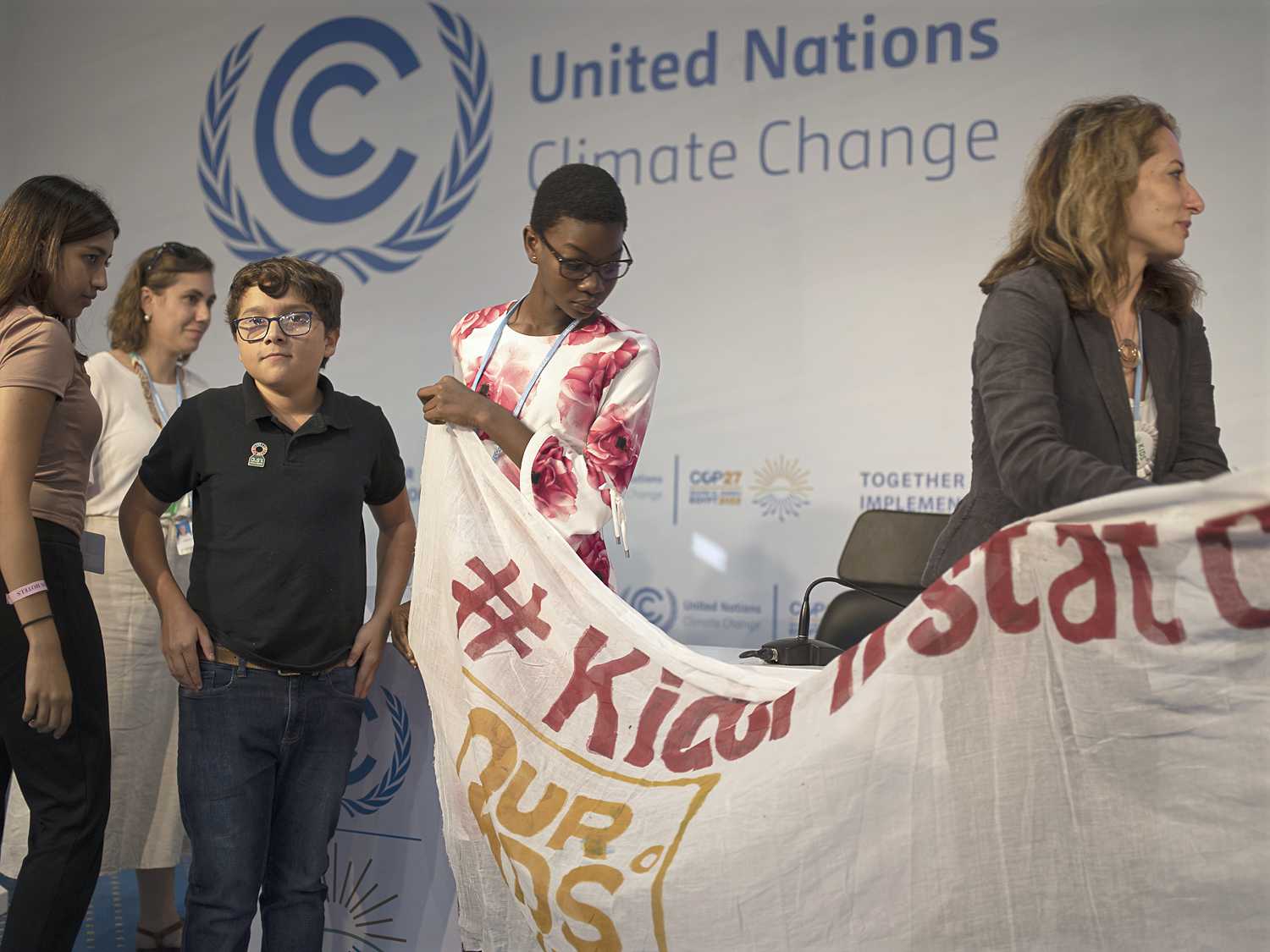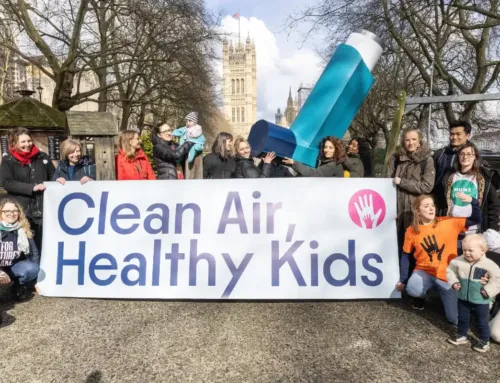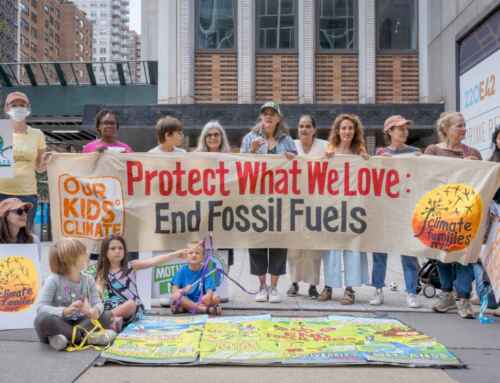PRESS RELEASES
In a first, at COP27 countries are urged to include children in the design and implementation of climate policies
Children First Climate Movement welcomes recognition by countries at COP27 that children are agents of change that should be included in the design and implementation of climate-related policies and action. This, and the historic establishment of a fund for loss and damage for frontline communities, represent important steps to rectifying injustice to the most vulnerable group affected by the climate crisis. However, the failure at COP27 to take the action required to stem the source of the crisis – fossil fuels – will continue to undermine children’s rights and future wellbeing.
20 November 2022, Sharm-el Sheikh: Today, in a long overdue decision, all governments at COP27 agreed to formally recognize children as agents of change in addressing and responding to climate change and encouraged governments to include children in the design and implementation of climate-related policies.
Children represent a third of the global population and are the ones who suffer the most from the impacts of the accelerating climate crisis – a crisis that they did not create. From worsening disasters such as floods and wildfires to water and food shortages, these impacts undermine children’s development and put their basic rights at risk. This is particularly the case for those children already struggling to enjoy their rights, such as children from low-income families, children with disabilities, Indigenous children, girls and children on the move. The landmark agreement to establish a fund on loss and damage must address the disproportionate risks faced by children, and ensure that their rights are at the heart of action to operationalize the fund.
The COP27 outcome also encourages all member states to include young representatives (both children and youth) and negotiators in their national delegations, and invites future Presidencies to continue appointing a youth envoy and hosting a Children and Youth Pavilion. COP27 oversaw the first-ever Children and Youth Pavilion, providing a lively and dynamic space, led by child and youth movements, and fostering a safe and vibrant space for child and youth participation at the COP. Critically, Parties agreed to actions to enhance children’s climate education and empowerment within the formal process, through the establishment of dedicated child-focused activities under the new Action for Climate Empowerment Action Plan.
COP27 represents the first environmental negotiation process to include an explicit reference to the human right to a clean, healthy and sustainable environment based on the landmark UNGA Resolution approved in July this year. This will bolster efforts to mainstream rights in environmental governance, including the forthcoming UN Committee on the Rights of the Child’s General Comment No. 26. on child rights and the environment, with a special focus on climate change.
However, despite these important milestones, COP27 did not agree to a rapid and equitable phase out of all fossil fuels. Without the commitment to rapidly phase out the use and subsidy of coal, oil and gas, the rapidly-reducing window of time for securing a safe and stable future for children continues to get smaller. The burning of fossil fuels is the main driver of the climate crisis and is destroying the health and prospects of all children on earth, particularly the poorest and most vulnerable.
The Children First Climate Movement calls on all governments to address this glaring gap, to urgently bring forward more ambitious emissions reduction plans that can credibly keep 1.5 degrees alive and reduce loss and damage. Progress with respect to recognition of children’s role must be translated into climate action at the national level, and their needs and priorities must play a central role as we look towards COP28.
—————————————–
QUOTES
“It was an important COP for children and their rights! In addition to the creation of the Loss and Damage Fund, which will positively impact children and their families and communities in poor countries in the Global South, children, girls and youth were contemplated in several decisions, demonstrating that children are not just the future generations; they are already suffering the dramatic weight of the climate crisis. Droughts and lack of food, the floods and the need to migrate and all other violations and violence resulting from extreme climate events are already part of children’s daily lives. So we need to bring the future now into the present, protecting children and their rights through climate policies and actions! And that’s what these decisions at COP27 are helping to do, compelling national states to act now.” Pedro Hartung, Executive Director, Alana Foundation
“Leaders at COP27 have taken a small but critical step in securing justice for children most affected by the climate crisis, by formally recognising children as agents of change and setting up a fund for loss and damage. But far more needs to be done to secure children’s futures. Across the world, children are going hungry, they are unable to go to school, their health is at risk, and many are displaced due to the impacts of the climate crisis that are already happening. This is mostly felt by children in low-income countries and those impacted by inequality and discrimination. One of the standouts of COP27 was the incredible participation of children and youth speaking truth to power. The Children and Youth Pavilion, led by youth organisations and supported by Save the Children and other groups was a constant hive of activity. But children need to have influence in the negotiations themselves and be able hold their governments to account. It is welcome that leaders are finally starting to wake up to this fundamental right – but much more must be done. Crucially – as we mark World Children’s Day – the failure to protect children from a future blighted by the continued use of fossil fuels is unacceptable. Children are clearly demanding a safer, cleaner world – and we know there is no time to waste.”
Yolande Wright, Global Director of Poverty and Climate, Save the Children International
The creation of a Loss and Damage Fund, thanks to the tireless efforts of civil society, and vulnerable countries, is a historic breakthrough. From an early age, we teach our children to share and show compassion – to play fair. It is basic fairness that those communities who have done the least to contribute to carbon pollution should receive support from rich countries to rebuild and repair after climate disasters hit.
This COP also saw important strides when it comes to children’s rights and participation, with the first ever Children’s and Youth Pavilion a hive of activity and dynamism.
But COP27 failed to address the core driver of the climate crisis: the burning of fossil fuels. Without an urgent phase down of all fossil fuels, disasters will continue to worsen with children, particularly those in the global South, paying the heaviest price. This is a grave injustice. We will continue to fight for the right for all children to breathe clean air and grow up on a healthy planet. Maya Mailer, Co-Director of Our Kids’ Climate
One billion children are already feeling the impacts of the climate crisis, and nothing can compensate for the massive trauma and disruption to children’s lives brought about by climate-related disasters. However, it is welcome that developed countries have finally stepped up and agreed to the long-standing demands of vulnerable countries to establish a loss and damage fund, sending a signal to children and families on the frontlines that their plight has been recognized, and that they will receive assistance to pick up the pieces when disaster strikes. This fund must now be filled with new and additional finance, and rapidly operationalized. Developed countries must also deliver on their long-overdue commitment to provide $100 bn a year to developing countries, and to rapidly scale up finance for adaptation in particular, which children facing the climate crisis need so urgently now.
COP27 saw significant progress in explicitly recognizing the role of children as agents of change, and the need to include them in designing and implementing climate policy and action. If this were the case, we would surely not have a situation in which the agreement here in Sharm El-Sheikh failed to address the source of the problem – the burning of all fossil fuels – nor in which fossil fuel lobbyists outnumbered representatives of the ten most climate-vulnerable nations by 10:1. The explicit recognition of the right to a clean, healthy and sustainable environment in the COP27 outcome decision is a welcome step forward, and action and support to fulfil this right through urgent climate action that considers children’s specific needs and priorities, must be a priority for governments moving forward. Joni Pegram, Director of Project Dryad
While today’s decision at COP27 contained important steps forward with regards to recognising the role of children in tackling the climate crisis and creating a loss and damage fund, we remain hugely concerned at the lack of a commitment to phase out all fossil fuels. It is this addiction to fossil fuels which is plunging the future of current and future generations into uncertainty, affecting their rights, health and wellbeing.
We urge all governments to take bold action now.The science is clear. Time is running out if we are to limit the worst effects of climate change and leave a beautiful, healthy planet for generations to come. Listen to the countless children who have spoken out so courageously and with such moral conviction and do the right thing – rapidly phase out all fossil fuels.
As a community we will not give up. We will continue to advocate for – and with – children, for their right to a healthy environment. We are inspired by all the children and young people we saw and met at COP – including our own Climate Advisers – who spoke up and took action for a better world. We will continue to act with them – they care, have rights and their ideas, passion and convictions can inspire those with power to take bold climate action now. – Lianne Minasian, Co-Director, Child Rights International Network (CRIN)
References to children in COP27 decision text
Acknowledging that climate change is a common concern of humankind, Parties should, when taking action to address climate change, respect, promote and consider their respective obligations on human rights, the right to a clean, healthy and sustainable environment, the right to health, the rights of indigenous peoples, local communities, migrants, children, persons with disabilities and people in vulnerable situations and the right to development, as well as gender equality, empowerment of women and intergenerational equity
83. Recognizes the important role of indigenous peoples, local communities, cities and civil society, including youth and children, in addressing and responding to climate change and highlights the urgent need for multilevel and cooperative action in this regard;
87. Recognizes the role of children and youth as agents of change in addressing and responding to climate change and encourages Parties to include children and youth in their processes for designing and implementing climate policy and action, and, as appropriate, to consider including young representatives and negotiators into their national delegations, recognizing the importance of intergenerational equity and maintaining the stability of the climate system for future generations;
88. Expresses its appreciation to the Presidency of the twenty-seventh session of the Conference of the Parties for its leadership in promoting the full, meaningful and equal participation of children and youth, including by co-organizing the first youth-led climate forum (the Sharm el-Sheikh youth climate dialogue), hosting the first children and youth pavilion and appointing the first youth envoy of a Presidency of the Conference of the Parties and encourages future incoming Presidencies of the Conference of the Parties to consider doing the same;





